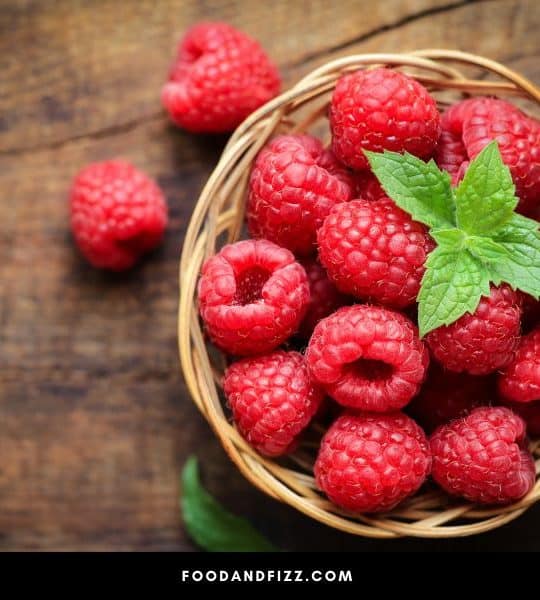As kids, we’ve all probably experienced the anxiety of accidentally eating a fruit seed and then worrying endlessly that a few months later, a tree or a plant will grow out of our stomachs.
As horrifying as that sounds, it is a relief to know that the possibility of that ever happening is close to zero (our stomachs are much too acidic for seeds to grow).
But are they actually advisable to eat? For example, berries like raspberries have a ton of seeds in them. Are there any risks or concerns we should be mindful of when we consume the seeds of these berries? Can you eat raspberry seeds?
Can You Eat Raspberry Seeds?
Raspberry seeds are edible and are very nutritious. They are high in omega-3 fatty acids, fiber, and antioxidants that play a role in preventing and combating diseases like cancer, high blood sugar, and heart disease. Much research still needs to be done but much like the fruit itself, the seeds also contain a lot of health benefits.
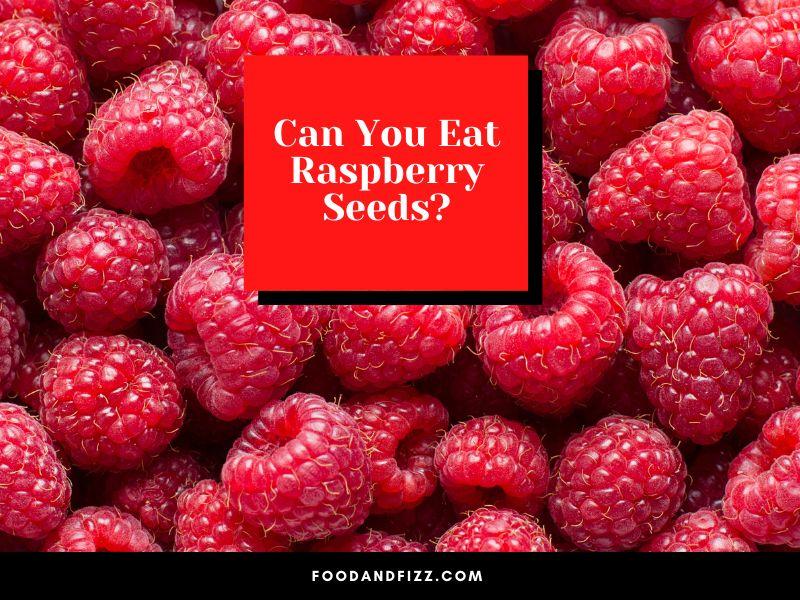
Can You Eat Raspberry Seeds?
Not everyone likes the crunch or texture of raspberry seeds but they are actually a very nutritious part of the raspberry.
Depending on what you are using the raspberries for, they may be extracted or removed, but in general, they pose no harm to us when we consume them intact, and in fact contain a host of health benefits.
They are small enough to be ground by our teeth and unlike the seeds of other fruits, they are not known to contain any dangerous compounds that may adversely affect our health.
In fact, raspberry seeds contain many beneficial compounds that promote health, and raspberry seed oil, or oil that has been pressed from raspberry seeds, is becoming more and more popular as an ingredient in the cosmetics market, due to the compounds present in them that promote and protect skin health.
Raspberry seeds add texture to jams and smoothies and other desserts, and at least for me, are part of the delight of eating raspberries.
What Are Raspberries?
Raspberries are an edible fruit typically described as having a sweet and tart taste. Raspberries are very popular and are part of a group of fruits called aggregate fruits, or fruit that are a collection of many tiny “fruitlets” or beads that share a common surface or receptacle.
Each tiny bead on raspberries is called a “drupelet”, and each druplet contains a tiny seed. A normal raspberry would have hundreds of seeds in them. Raspberries are well-loved and are popular in jams, pies, smoothies, and many other culinary applications.
Raspberries are typically red in color, although there are varieties like black, purple, and golden or yellow. Certain varieties only produce fruit in the summer, while other varieties produce fruit both in the summer and the fall.
Raspberries are hardy and can be invasive and grow wild and free, but they typically like cooler climates so they are more commonly found in temperate regions.
Interestingly, raspberries can also carry tiny bugs, but these are mostly harmless. Read : “Tiny Bugs in Raspberries – Is this A Thing?”.
Kinds of Raspberries
There are generally four kinds of raspberries:
1. Red Raspberries
Red raspberries are the most common type of raspberry and what you would normally find in the stores and the markets. Their taste is sweet and subtly tart.
2. Golden Raspberries
Golden raspberries are rarer than red raspberries and are typically specially grown, which means they can be more expensive. Flavor-wise, they are sweeter and milder than the regular red variety.
3. Black Raspberries
This variety may understandably be confused with blackberries due to their similarity in appearance. To distinguish them from each other, black raspberries have a hollow core and tiny hairs on the outside unlike blackberries, which have a smoother exterior.
Black raspberries also are more perishable than blackberries and must be stored properly.
Because of their deep black and purple color, both contain a high amount of anthocyanins, which have anti-inflammatory benefits, among others. Because of this, black raspberries have a higher antioxidant content than their red counterparts.
They are also called blackcaps.
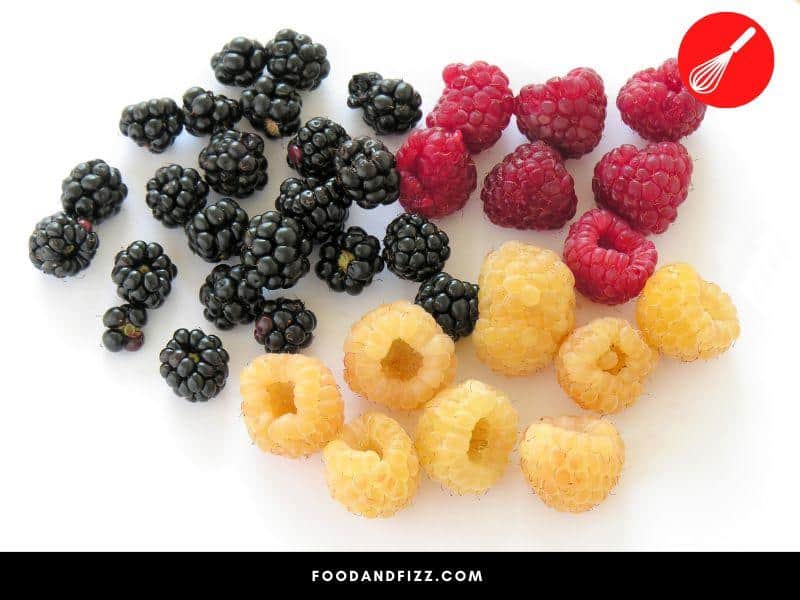
4. Purple Raspberries
Purple raspberries are a hybrid between the black and red raspberry varieties and are larger than red raspberries. Because their sugar content is higher than regular red raspberries, they are also sweeter. Like black raspberries, they are also rich in anthocyanins.
Regardless of the type of variety you choose, all types of raspberries are considered superfoods, or food that offers impressive health benefits.
Health Benefits of Raspberries
Raspberries are well-loved, not just for their unique taste, but also for the many health benefits that they offer. We’ll look at some of them below.
1. Antioxidants
Along with other berries, raspberries are very high in antioxidants. Antioxidants protect the body from damage by binding to the free radicals and helping to eliminate them from the body.
Free radicals are very reactive and unstable molecules in the body that when left on their own, cause damage to the cells of the body, leading to illness and aging.
Antioxidants “pair up” with these free radicals and helps the body get rid of them before they cause damage. Loading up on anti-oxidants like raspberries helps protect the body from illnesses that can be brought about by the proliferation of these free radicals.
2. Low in Sugar and Calories
Compared to other fruits, raspberries and other berries have lower amounts of sugar in them and contain fewer calories. They only contain about 5 grams of sugar per cup, making them an ideal fruit for those who need to watch their sugar intake.
3. Fiber
Raspberries are also packed with fiber, which helps you feel full longer and aids in healthy digestion. They contain 8 grams of fiber per cup, making them a considerable source of dietary fiber.
Raspberry seeds contribute significantly to this roughage count. A diet high in fiber is essential to maintain a healthy gut and to prevent illnesses from developing as most illnesses start from the gut.
4. Anti-Inflammatory
Raspberries are also rich in compounds that fight and prevent inflammation, that help reduce the risk of diseases such as heart disease and autoimmune disorders.
The body’s natural response to stress and injury is inflammation, which helps it cope but chronic inflammation can exacerbate and even cause serious disease. Anti-inflammatory foods like raspberries help the body deal with inflammation effectively and help promote optimum health.
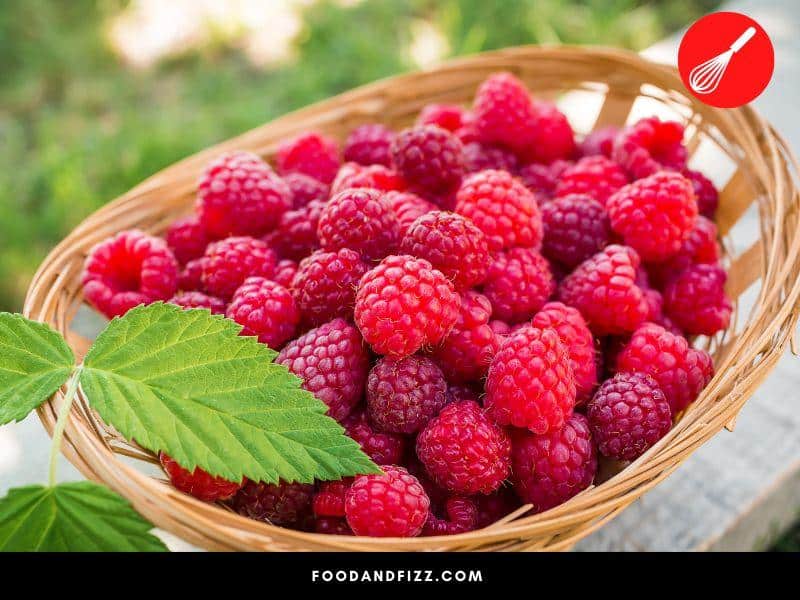
5. Ellagic Acid
Ellagic acid may not be a very familiar term but it is an important substance that has been found to decrease and inhibit the growth of cancer cells and has been shown to be beneficial in treating and preventing diabetes and protecting brain health.
Raspberries contain one of the highest levels of ellagic acid in fruits and make them an excellent addition to a health-promoting diet.
6. Vitamins and Minerals
Raspberries are a great source of vitamins like Vitamin C and E, which boosts immunity and skin health. They also contain minerals like manganese, potassium, iron, calcium, and selenium, which all play important roles in maintaining healthy bodily processes.
7. Raspberry Seed Oil
Raspberry seed oil, or oil that is derived from pressed raspberry seeds, is popular in the cosmetics industry as an ingredient for skincare products. Some of its touted health benefits, when included in skin products, include:
- absorbs some types of UV rays which makes it a natural sun protectant
- slows down aging and aids in cell regeneration and growth
- as it has anti-inflammatory properties, it is used in soothing conditions like eczema and psoriasis
- doesn’t clog pores and helps skin rehydrate and balances its natural oils
For such a small fruit, raspberries sure pack a strong punch with their many health-promoting benefits.
How to Use Raspberries
Now that we know that raspberries are a nutritional powerhouse, we naturally want to add more of them to our diets. Aside from eating them raw, as is, what else can we do with them?
Below are just some uses for raspberries that you can incorporate into your culinary adventures:
- Use as topping for yogurt or oatmeal or mix in with your cereal
- When frozen, can be added to healthy smoothies (Read: “Do Smoothies Have Ice Cream?“)
- As a topping for waffles and pancakes
- Can be made into a pie, or in cobblers and crumbles
- Can be made into a sweet sauce for cheesecakes, or a savory sauce for meat like pork or even a savory sauce for cheese puffs
- Added to salads or baked into muffins
- Made into jam
These are only some of the uses of raspberries, both fresh and frozen. There are many other creative ways to use raspberries, which ensures that we can easily incorporate them into our daily diet.

Raspberry Seeds – How Do I Remove Them?
If you find that you have a distaste for or otherwise want to use raspberries without the seeds, there are things you can do to remove them.
You can run the berries through a food mill, or crush them with a wooden spoon over a strainer or sieve, or cheesecloth to separate the seeds from the rest of the fruit.
Depending on what you are using it for, this may be a necessary step to ensure the right texture of your final product. However, if you can, keeping the seeds on gives you added fiber and added health benefits.
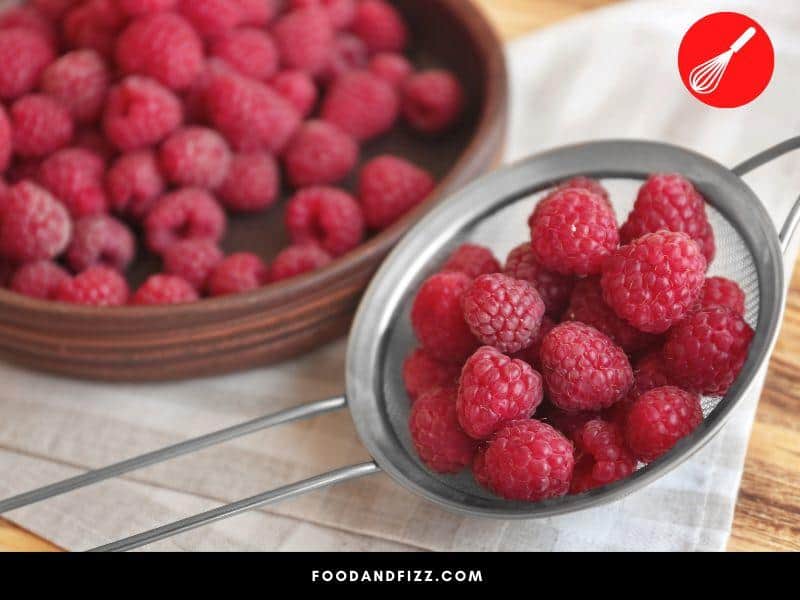
Frequently Asked Questions to Can You Eat Raspberry Seeds?
Can You Eat Raspberry Seeds?
Raspberry seeds are edible and safe to eat. They contain fiber and vitamins and minerals that promote health and prevent disease.
Are Raspberries Good for You?
Raspberries are a nutritional powerhouse and contain vitamins, minerals, and important compounds that encourage healthy functioning in our bodies. They are also high in antioxidants and anti-inflammatory compounds that have been shown to protect the body against diseases like high blood pressure, diabetes, cancer, and chronic inflammation.
Can Raspberry Seeds Be Removed?
Raspberry seeds can be removed by crushing the berries and straining them using a strainer, sieve, or cheesecloth, or running them through a food mill.
Conclusion to Can You Eat Raspberry Seeds?
Unlike seeds of other fruits like apples and cherries, raspberry seeds can be safely eaten and do not pose a danger or threat to us health-wise when we consume them.
In fact, they even contain fiber and lots of vitamins and minerals that help our bodies maintain healthy functioning.
However, as with most foods, it is also important to practice moderation in consuming them. Even if they are healthy and have a lot of health benefits, too much anything is also not a good thing.
What’s more important than how many nutritional superfoods we consume is how we are able to incorporate and balance them into a healthy way of living and eating.

